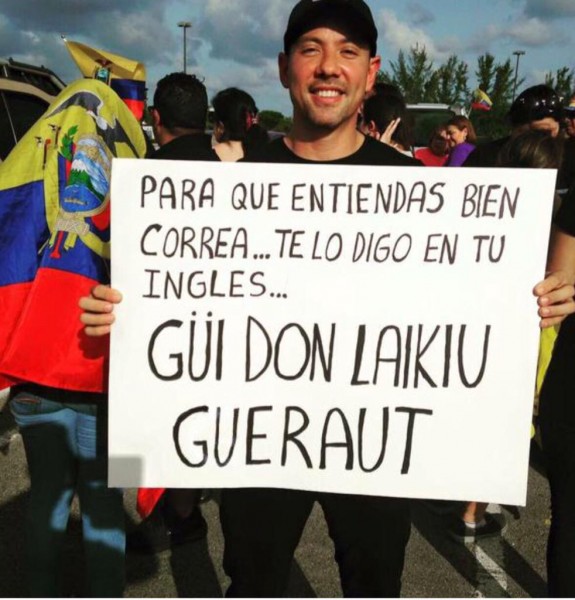
Ecuadorian citizen holding a sign mocking President Correa's English: “In order for you to understand, I'll say it in your English…'We don't like you. Get out'”. Photo by Twitter user @beadomenech95
Despite Ecuador having received praise for reducing poverty over the last years the South American country is currently facing a challenge to meet its fiscal budget as a result of the rut in global prices for its key oil export.
As politicians wrangle over finances, a wave of internet-to-street protests have been held across several of the country's cities.
The protests are a response to a wealth redistribution law that would impose new taxes on inheritance and capital gains. President Rafael Correa recently postponed this legislation in order to put an end to the marches and create a “peaceful and pleasant” atmosphere for Pope Francisco, who will arrive in the capital Quito on Sunday.
Nevertheless, milder protests and counter-protests continue to be held throughout several cities in Ecuador, most notably those led by the mayor of Guayaquil (the country's second most important city), Jaime Nebot, and Paul Carrasco, prefect of the Azuay province.
In his article for GKillCity entitled, ‘What would happen if #FueraCorreaFuera (#OutCorreaOut) were successful?’, analyst Matthew Carpenter-Arévalo (Canadian born, but Ecuadorian in spirit) develops an argument millions of Ecuadorians caught up in the struggle seem to have missed:
Los gobiernos de turno seguirán profundizando la división ciudadana, porque su capacidad de mantenerse en el poder no dependerá de un diálogo abierto entre diferentes sectores, sino en su habilidad de mostrar la prevalencia del músculo de su militancia sobre otras. Si seguimos con golpes de Estado, no habrá fortalecimiento de las instituciones públicas, ya que ceder el control de cualquier institución significará generar debilidad y vulnerabilidad para sostener el poder. La inversión extranjera — que tanta falta nos hace para desarrollar nuevas industrias nativas— tampoco llegará, porque es justamente la inestabilidad política continúa que disuade cualquier inversión grande que genere beneficios en el largo plazo.
Current governments will continue to deepen the divide between citizens because their ability to stay in power will not depend on an open dialogue with the different sectors of society, but rather on their ability to demonstrate the prevalence of their militant strength over others. If we continue with coup d'états, there will be be no fortifying of public institutions, since relinquishing control of institutions will mean generating weakness and vulnerability [in the struggle] to sustain power. Foreign investment — which we so desperately need in order to develop new domestic industries — won't come either due to this never-ending political instability.
In regards to the Correa administration, he writes: “A person or political party that stays in power without consulting the people represents a threat to the democratic order. However, that does not justify a coup d'état as an alternative to a ballot by popular vote.”
He also reminds Ecuadorians that democracy does not mean replacing one anti-democratic group for another:
Cuándo el Presidente dice que solo quiere hablar con oposición “de buena fe” —seguramente definida por él—, y cuándo el experiodista/excandidato Carlos Vera dice que “con la dictadura no se debate: se combate,” están manifestando una misma cultura política antidemocrática, en la que el diálogo no se da porque la descalificación (unilateral) del otro. En una cultura democrática el diálogo es una puerta que nunca se cierra a nadie. No es un aditivo secundario a la democracia: es su esencia sagrada.
When the President says that he only wants to talk with the opposition “in good faith” — surely defined by his terms — and when the former journalist/candidate Carlos Vera says that “dictatorship is not debated: it is fought for”, they are both expressing the same anti-democratic political culture, in which dialogue cannot take place due to the (one-sided) disqualification of the other. In a democratic culture, dialogue is a door that nobody can close. It is not a minor addition to democracy — it is its very sacred essence.






